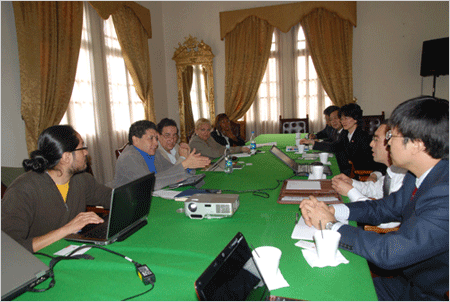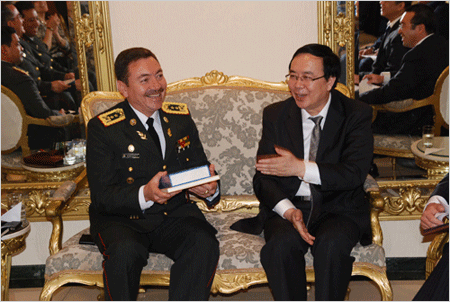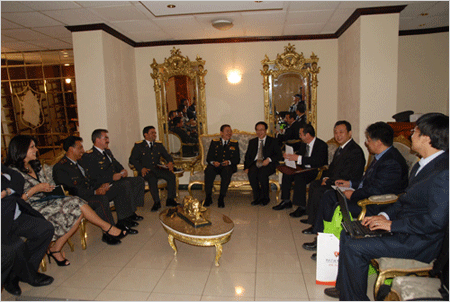
From May 13 to May 16, a delegation led by OUC Vice President Zhang Shaogang visited Ecuador at the invitation of the Embassy of the People's Republic of China in Ecuador. The delegation held talks with representatives from the Ecuador government and was briefed on the status of open and distance education in Ecuador.

In the capital city of Quito, the OUC delegation met with leaders from the Ecuadorian Ministry of Foreign Affairs, the National Secretariat of Communication, the community projects of the president’s office, and the vice president's "Operation Smile Ecuador" to aid the disabled.

The economy of Ecuador is dominated by agriculture, with 47% of the total population working in agricultural industries. As such, there is a great need for advanced agricultural technologies. The OUC has expertise in constructing resources related to practical agricultural technologies, and thus collaboration in this regard was an important focus of the meetings. Moreover, with more and more Chinese companies doing business in Ecuador, there is an increasing demand for learning the Chinese culture and language.
Luis Mueckay, Director of Cultural and Intercultural Promotion of the Ministry of Foreign Affairs, said that Ecuador has placed great emphasis on education in recent years. In addition to compulsory education, community education and education for the disabled are also included in the government's education plan. Mueckay hoped that Ecuador could learn from the OUC's experiences and technologies in distance education for the disabled and look into launching web-based education for the disabled in conjunction with Ecuador's organizations for disabled people. The National Secretariat of Communication hoped to further discuss collaboration in teaching Chinese as a foreign language. Vice President Zhang Shaogang of the OUC focused his introduction on the OUC's accomplishments in education for the disabled, the promotion of practical technologies and teaching Chinese as a foreign language. Zhang also demonstrated related teaching resources.
Participants on both sides discussed the possibility of collaboration in domains such as distance education, teaching Chinese as a foreign language, education for the disabled, and promotion of practical agricultural technologies. Ecuador's representatives spoke highly of the OUC's achievements and showed great interest in using open and distance education to expedite progress on the above mentioned tasks.
On May 14, the OUC signed a cooperative memorandum of understanding (MOU) with the Army Polytechnic School (Spanish: Escuela Politécnica del Ejército) in Quito, outlining an agreement to work together to teach Chinese as a foreign language in Spanish-speaking areas, develop video training courses on practical agricultural technologies and arrange for exchange visits between the two schools. The MOU aims to initiate academic collaboration between the two schools in joint research, personnel exchange, and the sharing of publications and teaching resources.

This round of cooperation between the Army Polytechnic School and the OUC is focused on launching Internet-based Chinese language instruction for speakers of Spanish. Moreover, collaboration in agricultural technology training will be further explored.
Brigadier Carlos Rodríguez Arrieta, Rector of the Army Polytechnic School, expressed his willingness to further discuss details of the MOU projects with the OUC. In line with the terms of the MOU, the two sides will further explore and define areas of collaboration, and the Army Polytechnic School will send a high level delegation to the OUC to continue implementation of the projects.

About the Republic of Ecuador:
The Republic of Ecuador is situated in the northwest of South America, covering an area of 256,370 square kilometers. The equator runs across the north of the country, and thus it is named Ecuador. Ecuador's main industry is agriculture, which employs 47% of the total population.
About the Army Polytechnic School:
The Army Polytechnic School has a history dating back to 1922, when it was first established as the Officers School of Engineering. In 1977, its name was formally changed to the Army Polytechnic School (Spanish: Escuela Politécnica del Ejército, or ESPE), and teaching centers were established throughout the country. The university is committed to training professionals with creativity and leadership skills. There are over 24,000 students currently registered, and nearly half of them are distance learners. The curriculum encompasses fields such as commerce, tourism, education, military management, foreign languages, architecture, energy and agriculture, and includes a major in Chinese. The university actively participates in interscholastic exchanges and signed more than 120 cooperative agreements with different universities in 2011.
By Wang Shuo, the OUC